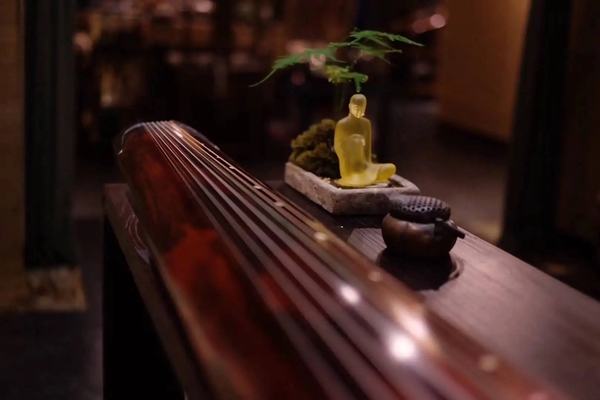Famous scholars of Wei and Jin Dynasties and Guqin
During the Wei and Jin Dynasties, the guqin was favored by the celebrities of the Wei and Jin Dynasties. From the "Seven Sons of Jian'an" to the "Seven Sages of Bamboo Forest", and then to a large number of celebrities in the Jin and Jin Dynasties, or qin books for self-entertainment, or qin wine to relieve worries, it has become common to make friends with qin. The qin occupies a very important position in the lives of celebrities, influencing and embodying their spiritual world, and has become a symbol of "wei and Jin demeanor" and "fame of celebrities". The Wei, Jin and Six Dynasties were the period when the guqin was finalized, and it was also the prosperous period of the art of guqin in history. The admiration of Guqin art by celebrities in Wei and Jin Dynasties is an important driving force for the development of Guqin.

Confucius once said: "If the Tao is not good, ride a raft to float in the sea." ("The Analects of Confucius • Gongye Chang") means that if one's ideal cannot be realized, one must retreat to nature. The special political climate of the Wei and Jin Dynasties made the fashion of seclusion prevail, literati retreated to the mountains and rivers, and the Lao-Zhuang thought of advocating clear talk prevailed, which influenced the music trend at that time and had a profound impact on later literati. The "Seven Sages of Bamboo Forest" live in a turbulent and eventful autumn. In order to protect themselves, seclusion is an effective way to avoid reality. Ji Kang and Ruan Ji were the more representative figures of this period.
The three generations of Ruan Ji's family are fond of music. His father Ruan Yu is one of the famous "Seven Sons of Jian'an" in the literary world. He is good at playing the piano and composing poetry. Ruan Xian, his nephew, was evaluated in "Book of Jin" as "deciphering the rhythm wonderfully and playing the pipa well". The scholars of the Wei and Jin Dynasties had a special relationship with wine. In the extremely dark and terrifying political environment of the Sima family, drinking and indulging was a suitable way to forget the reality and protect oneself. According to legend, the qin piece "Drinking Crazy" was written by Ruan Ji. The so-called solution to the problem in "Magic Secret Pu" (1425) says: "By sighing that the Tao is not suitable, it is not in line with the times, so I forget the world and worry about the body, and I am interested in drinking, and I am interested in life. Are you really addicted to alcohol? There is a way to keep it! The beauty lies in it, so it is not a common way, and the master can get it." The drunken feigned madness expresses the criticism and non-cooperation of the ruler, and through the description of the drunken staggering pace The demeanor is used to vent the pent-up injustice in the heart, and the music is implicit and profound in meaning.
Ji Kang's "Sound without Sorrow and Music" expounds his musical aesthetics in an anti-traditional and speculative way, which advocates nature, pays attention to emotional experience, and pays attention to the special laws of musical art aesthetics. "Qin Fu" is the artistic reproduction and deepening of this idea. "Qin Fu" is a poem that praises the art of guqin. It vividly describes the various expressions of the art of qin music, and comprehensively describes the origin, production materials, performance, and sound of the qin. Ji Kang likes to play "Guangling San" very much. Suoqin played this song before his execution, and he sighed deeply: "Guangling San" is gone now, showing Ji Kang's character and thought and this song's exciting and powerful tone. Ting's style of qin music and its thoughts and feelings are consistent. For thousands of years, "Guangling San" has always been associated with the name of Ji Kang.
Qin, wine, medicine, poetry and prose constitute the complete personality of the scholars of the Wei and Jin Dynasties. People call this period the era of "human awakening" in Chinese history. The search for the true meaning of human self-consciousness should be said to have begun in the Wei and Jin Dynasties. The close connection between the philosophical spirit and Guqin music at this time is unique in ancient Chinese history. Wei and Jin qin music thought embodies the artistic life of celebrities, who use their own words, deeds and poems to make life reach the realm of art. And this kind of art is natural and the expression of human nature.
 渝公网安备 50010702504639号
渝公网安备 50010702504639号